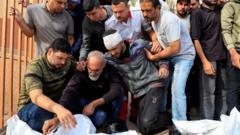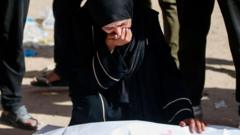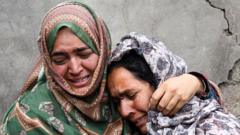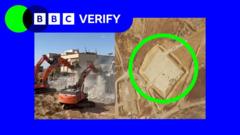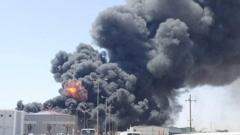As military actions escalate and a blockade continues, residents of Gaza share heartbreaking stories of starvation and desperation, with many children going to bed hungry. Despite claims from the Israeli government of adequate food supplies, the reality on the ground tells a different story as hospitals and food kitchens face collapse, leaving families to fend for themselves.
Gazans Face Dire Food Shortages Amid Heightening Conflict
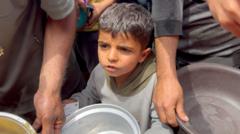
Gazans Face Dire Food Shortages Amid Heightening Conflict
The ongoing blockade in Gaza has left families struggling to meet basic needs, with the UN warning of impending famine.
In Gaza, the cries of children echo through the tents of a displacement camp as families grapple with the harsh realities of hunger and deprivation. Six-year-old Ismail Abu Odeh, waiting for food in a crowded center, fights to reach the front of the line, only to have his bowl of lentils knocked to the ground. His tears are a vivid reflection of the daily struggle facing many families in the enclave. With no water or food deliveries arriving the following day, his family's distress deepens as supplies dwindle.
The BBC’s recent coverage illustrates the dire situation in Gaza as Israeli military actions intensify and a total blockade, now lasting over ten weeks, persists. As international organizations warn of impending famine, the Israeli government asserts that there is no food shortage, attributing the crisis to Hamas' alleged misconduct with aid supplies. However, voices from Gaza tell a different story - one of desperation and scarcity, where finding even one meal a day has become a monumental challenge.
Residents reveal that food kitchens are shutting down due to lack of supplies, while remaining markets sell overpriced basics that most cannot afford. One man responsible for a food kitchen acknowledges his daily battle to source essentials. Another volunteer spoke of the closure of his kitchen, describing the feeling of despair that results from not being able to provide for those in need.
The impact is acutely felt among families. Adham al-Batrawi, displaced from his home in al-Zahra, describes creative adaptations in cooking to stretch meager supplies, while nurse Rewaa Mohsen provides glimpses into the emotional toll of chaos and uncertainty while caring for her young daughters amid the rubble of their home.
In the face of these hardships, medical professionals underscore the toll of the blockade on healthcare facilities. Reports of shortages of painkillers and essential supplies plague hospitals, leaving staff working under continual threat amid Israeli strikes. The European Hospital was recently struck, forcing staff and patients to relocate, highlighting the continual cycle of suffering.
Amidst growing criticism of the situation, the U.S. has announced plans for new humanitarian aid systems, while criticisms mount that such efforts may inadvertently weaponize the very assistance meant to help those most in need. As Ismail's father poignantly reflects, many parents in Gaza have begun to accept a heartbreaking new normal where their children go to bed hungry, revealing the profound humanitarian crisis at hand.


